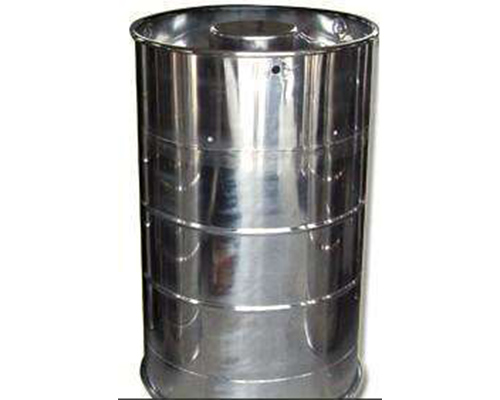
Yingkou Hengyang New Energy Chemical Co., Ltd.
Address: Xianren Island Energy and Chemical Zone, Yingkou City, Liaoning Province, via the west side of the Fourth Road
Zip code:115200
Telephone:18241754999
Fax:0417-6775999
E-mail:1313264@qq.com
Website:en.yingkouhengyang.com
The synthetic methods of diethyl carbonate are mainly divided into liquid phase method and gas phase method. The liquid phase method needs complex process and separation means because of the separation and recovery of products and catalysts from reactants. The preparation of dialkyl carbonate by vapor phase decarbonylation was studied by Yoshida Shinzeng et al. of Japan. It was found that diethyl carbonate was synthesized by atmospheric pressure reaction with potassium carbonate as catalyst at 200-300 C. The selectivity of the reaction was over 90% while maintaining high STY. The selectivity and yield of the decarbonylation of diethyl oxalate are relatively high. The reaction is carried out in the gas phase with less environmental pollution and mild reaction conditions. The by-product of the reaction is carbon monoxide, which needs to be recovered effectively. This method provides another way to prepare diethyl carbonate. Diethyl oxalate is synthesized by oxidizing carbonyl with C0 as raw material, and diethyl carbonate is synthesized by further decarbonylation. According to market demand, it is of positive significance to adjust the output of diethyl oxalate and diethyl carbonate. 4.2 The method of ethyl carbamate is that ethyl carbamate reacts with ethanol to produce diethyl carbonate and ammonia under the catalysis of tetramethylammonium carbonate. The ammonia produced by the reaction is immediately discharged into the reaction system. Compared with ethyl carbamate, the amount of ethanol is 2-5 times that of ethyl carbamate and the amount of catalyst is 0.03-0.06 times that of ethyl carbamate. The reaction temperature is 130-160 C and the reaction pressure is 0.5-2 MPa. The results of different reaction conditions and catalyst types show that the highest yield is about 20%. In the synthesis of DEC by ethyl carbamate method, the reaction conditions are relatively mild. However, the structure of ethyl carbamate and catalyst used in this method is complex and the preparation cost is high. 4.3 The direct synthesis of diethyl carbonate from ethanol and carbon dioxide is as follows: the reaction can be carried out in liquid phase or in gas phase. Among them, the catalysts used are molecular sieve supported copper catalyst, organotin catalyst, alkali series catalyst, magnesium powder catalyst, Cu-Ni composite catalyst and so on. In addition, the synthesis under C02 supercritical conditions has become a research hotspot. The catalysts used are magnesium ethoxylate, potassium carbonate-iodoethane, dibutyltin diethanoate and so on. Compared with the carboxylation of ethanol, this reaction has no thermodynamic advantage. Its prominent feature is the direct and effective use of CO2 gas, which is of great significance for solving greenhouse gas problems and optimizing the utilization of resources.
12 4.4 Fatty acid decomposition catalyzed by lipase has been gradually recognized in recent ten years. Lipase has a strong catalytic effect on a series of reactions containing unnatural acyl acceptors, such as ethanol, hydrogen peroxide, amine, ammonia water and oxime. On the other hand, the choice of raw materials for acyl reaction is limited to simple carbonates. It was found that Novozeym435 catalyzed the alcoholysis and ammonolysis of dibutyl carbonate and dibenzyl carbonate. These reactions have potential research value because they provide a biological route for the synthesis of carbonate derivatives. For example, the reaction of dibutyl carbonate, dibutyl carbonate and ethanol produces a single and double substituted mixture. The relative rate of enzymatic decomposition reaction increased with the order of dimethyl carbonate, diethyl carbonate, dibutyl carbonate and dibenzyl carbonate. Most of the enzymes used as catalysts for alcoholysis showed low activity, only Novozeym435 showed a suitable reaction rate; however, the reaction of lipid proteins obtained from pseudo-single cells was about 10 times slower than that of other fatty acids or ester-decomposing enzymes. This method has made a beneficial attempt to synthesize diethyl carbonate from a biochemical point of view, and provided a new idea for the synthesis of diethyl carbonate. 5. Conclusion With the development of the world economy, people pay more and more attention to the protection of the environment. Sustainable development strategy has become one of the important characteristics of the 21st century. In the new century, chemical industry should develop technologies to prevent environmental pollution from the source, pay attention to the atom economy of chemical reaction, realize zero emission, and produce environment-coordinated products with clean process, which will be the development direction of chemical industry. Among many methods for synthesis of diethyl carbonate, oxidative carbonyl synthesis has become the most promising one because of its atomic economy, pollution-free production process, mild reaction conditions, cheap and renewable reactants, which conform to the development trend of green chemical industry.
